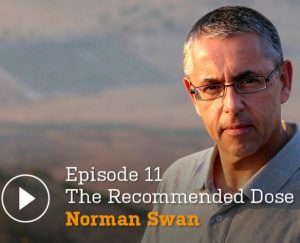
One of the best ways to become a better health journalist is to find out what the best in the biz are doing — and then make it your own. Great health journalism is happening all over the world, and, with his diverse, far-reaching résumé, pediatrician and broadcast journalist Norman Swan demonstrates the breadth of what journalists can accomplish.
As the longtime producer and presenter of the Australia Broadcasting Corporation’s Health Report, Swan is a bit like the antipodean version of the U.S.’s Sanjay Gupta. In addition to the Australian show, he is resident medic on “The Biggest Loser” reality show and has become a popular podcaster. In a recent podcast on Cochrane Australia, Swan was the guest, talking about medicine and the media.
The whole podcast is worth listening to (or reading if you choose the transcript instead), but here are a few highlights to whet your appetite.
Swan discusses a topic that has come up before at AHCJ conferences — the limitations of the systematic review. “It is at its simplest, an amalgamation of evidence and a re-analysis to see where the balance of evidence lies,” Swan told host Ray Moynihan. “But of course in the practice of it, it can vary a lot, and the debate within the Cochrane Collaboration is just how reliable some systematic reviews are in the inclusion, exclusion criteria.”
A systematic review is only as good as the studies it includes — and may be limited by the studies it leaves out — and Swan discusses this issue in the podcast. Their conversation is a reminder that health journalists relying on systematic reviews should be conscientious about the criteria the authors use to determine what to analyze.
Another discussion between Swan and Moynihan about interactions between patients and physicians offers insights, and possibly story ideas, for health journalists. Moynihan asks Swan, “You’re a big proponent of encouraging people to ask questions of their doctors and health professionals, and I think your partner … came up with a few key questions to ask: What are my options? What are the benefits and harms of those options? Moreover, how likely are those benefits and harms going to happen to me? And particularly, what happens if I do nothing? Do you think that people asking those questions can help the care they get?”
Swan’s response is worth hearing (or reading), and the questions are ones that journalists already should be asking as they report about medical research. Journalists also need to transparently and accessibly deal with uncertainty in the answers, and within medical research in general.
“People don’t like uncertainty, but that’s the nature of the clinical encounter,” Swan says. “I always say to people, if your doctor or physio is absolutely certain that this is going to help, I’d run for the hills and find somebody who displays their uncertainty, and shares that with you without making you unduly anxious.”
Similarly, journalists should be suspicious of researchers or physicians who appear overly confident about a treatment and don’t wrangle with the uncertainties that are part of all medical interventions (and science in general, really).
These are just a few topics Swan discusses that apply not only to patients but also to journalists. Whether you want to listen to the podcast while in the car or doing household chores, or it’s easier to read the transcript, it’s worth the time to learn what Swan has to say. So much of it applies not only to the average consumer but also to journalists writing for average health consumers as well.









